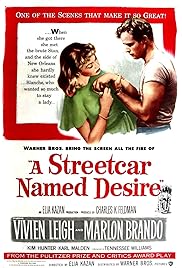


A Streetcar Named Desire (1951)



The 1951 film adaptation of Tennessee Williams’ play A Streetcar Named Desire is a classic of American cinema. The film, directed by Elia Kazan, stars Marlon Brando and Vivien Leigh in the iconic roles of Stanley Kowalski and Blanche DuBois. While the film is known for its powerful performances and its exploration of themes such as class, gender, and sexuality, it is also remembered for its sexual moments.
The film opens with a scene of Stanley and Stella (Kim Hunter) in bed, with Stanley’s shirtless body on full display. This scene sets the tone for the film’s exploration of sexuality, as Stanley’s physicality is a major part of his character. Throughout the film, Stanley is portrayed as a sexual being, and his relationship with Stella is a passionate one.
The film also features a scene in which Stanley and Blanche share a passionate kiss. This moment is significant because it is the first time that Stanley and Blanche have interacted in a sexual way. The kiss is a powerful moment, as it reveals the underlying attraction between the two characters.
The film also features a scene in which Stanley rapes Blanche. This scene is one of the most controversial moments in the film, as it is a brutal and disturbing depiction of sexual violence. The scene is a powerful reminder of the power dynamics between men and women, and of the dangers of unchecked male aggression.
Finally, the film features a scene in which Blanche is seen in a bathtub, her body partially exposed. This scene is significant because it is the first time that Blanche is seen in a sexualized way. The scene is a reminder of the power of Blanche’s beauty, and of the way in which her beauty can be used to manipulate and control others.
A Streetcar Named Desire is a powerful exploration of sexuality and gender. The film’s sexual moments are an important part of its exploration of these themes, and they remain some of the most iconic moments in cinema history.
No nudity. Lots of kissing.
Numerous references and discussions of a woman's sexual past, most of which are outdated views on promiscuous women.
Man has shirt off briefly in a few scenes.
A woman is implied to be naked under bedsheets in one scene; intercourse with her husband the previous night is implied too.
Lots of euphemistic innuendo in the dialogue. References to sexual promiscuity - and possibly prostitution - and even a scandal of a teacher romantically involved with a teen student.
A woman euphemistically accuses her sister of marrying a man only for his sex appeal.
A woman confesses she found out her late husband was gay but only those already familiar with the play on which this movie is based will pick up on this.
In a scene loaded with carnal desire, a shirtless man is approached by a woman coming down the stairs, and hugs her so that his face is next to her belly. She grabs and feels his back passionately. They kiss and he carries her off, sex is implied, but not shown.
A man slaps his wife's buttocks, to her embarassment.
Women change clothes in a few scenes but only strip down to undergarments. A man assists his sister-in-law in changing clothes and in another scene walks into a room where she is undressed. Lots of sexual tension.
A group of men make fun of another man for staring at a woman changing clothes through a curtain.
An adult woman flirts with a much younger (possibly teenaged) man and asks him to kiss her, which he does.
A woman says she wants the respect of a man whom she is dating, although men lose interest quickly, implying she hasn't had sex with him.
A man speaks of being able to have sex with his wife again once his sister-in-law leaves. In another scene, the wife briefly talks about her wedding night to her sister.
Man rapes his sister-in-law. We only see him grab her forcefully.
 Sign in with Google
Sign in with Google 






